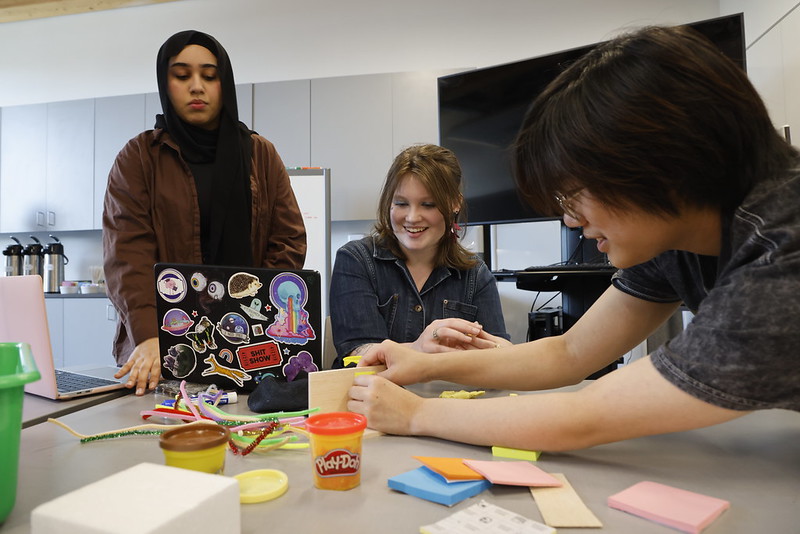
Global Innovation and Design Lab Awards micro credentials in Design Thinking
This was another banner year for the Global Innovation and Design Lab with a record 28 students and community participants completing the microcredential requirement to receive the Digital Thinking Applied Project Digital Badge. The culminating requirement is a presentation of the project at a public forum. UW Tacoma students presented at the May 22 Global Engagement Conference while students from the Institute for Black Justice presented their project at the 2023 Freedom Summer Symposium at the University of Puget Sound. The IBJ students continued their project into the next phase of prototyping in a February 2024 workshop with the GID Lab, featured in the story: IBJ's Thrive Center Takes Form in GID Lab.
Microcredentials are certifications of education, experience, and skill that are invaluable both for students in their gap learning and for executives who desire skills for the next level in their careers. Upon completion of the microcredential, the student or executive receives a Digital Badge. UW Tacoma is using Canvas Credentials as its Digital Badging service. Digital Badges are like virtual stickers, showcasing skills and accomplishments in a visually appealing way. Unlike traditional certificates, they're easy to share online, enhancing professional presence. They're credible and trusted by employers who can click on the badge and read more about the specific work undertaken to earn it. They're perfect for showcasing the learning journey on social media or a resume.
In Spring 2024, to demonstrate their learning and receive the badge, GID Lab interns produced two engaging design thinking workshops for their peers to shift how we think about navigation and advocacy. In Cartographic Gestures, held on May 1, workshop participants mapped how they move around Tacoma and ideated ways to improve navigation and quality of life in the city. Prototypes, inspired by the definition and ideation phases of the workshop, included adding bike lanes throughout the city to improve air quality and bike commuter safety as well as water features in the center of roundabouts to slow people down and improve traffic flow. Cartographic Gestures is part of a national project designed and led by GID Lab partner Make Art with Purpose (MAP). In this time of GPS navigation and moving about with eyes fixated on our phones, MAP created the project to learn how people visualize cities and towns and to generate ideas that improve how people engage with their cities. Additional project locations include Dallas (in partnership with Dallas Public Library) and Chicago (in partnership with The School of the Art Institute of Chicago). After each project, an atlas-like guide is published and distributed throughout each city.
On May 8, a second group of GID Lab Interns produced Reshaping Advocacy, a design thinking workshop centered on redesigning the student advocacy experience at UW Tacoma. With stakeholders in the room, including Holly Wetzel, Associated Students of UW Tacoma (ASUWT) President, and Ahmed Wafai, Student Retention and Community Development Specialist at the Office for Equity and Inclusion, the GID Lab Interns led their fellow students through brainstorming and ideation sessions. Participants recommended multiple ideas to improve access to student resources including a digital hub, a chatbot, small resource centers in high-traffic areas, and increased student networking opportunities. “As ASUWT is the liaison between students and UW Tacoma’s administration,” said Wetzel, “we can help make these ideas actionable by taking them to administrators to study and implement.” The GID Lab Interns will use the data from the workshop to design next-level prototypes to submit to ASUWT for consideration and action.













